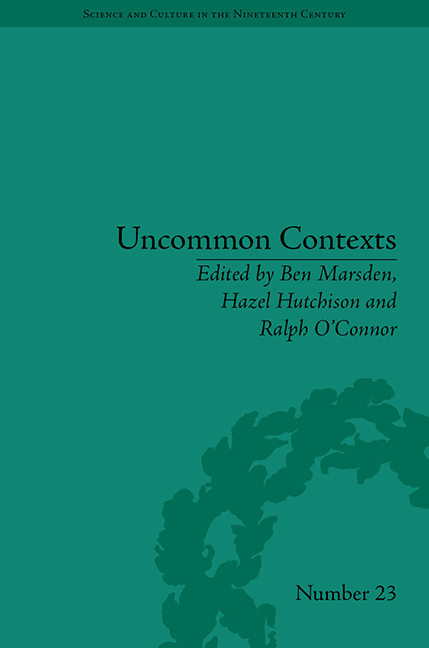Book contents
- Frontmatter
- Contents
- Acknowledgements
- List of Contributors
- List of Figures
- Introduction
- I Literary Genres of Science Writing
- II Pushing the Boundaries of ‘Literature and Science’
- Part III Science and Technology in Fiction
- 6 Elizabeth Gaskell's Social Vision: The Natural Histories of Mary Barton
- 7 ‘I Have in Mind a Study of a Scotch Seaman’: Witnessing Power in Joseph Conrad's Early Literature of the Sea
- 8 ‘The Telegraph has Other Work to Do’: Reading and Consciousness in Henry James's In the Cage
- Notes
- Index
6 - Elizabeth Gaskell's Social Vision: The Natural Histories of Mary Barton
from Part III - Science and Technology in Fiction
- Frontmatter
- Contents
- Acknowledgements
- List of Contributors
- List of Figures
- Introduction
- I Literary Genres of Science Writing
- II Pushing the Boundaries of ‘Literature and Science’
- Part III Science and Technology in Fiction
- 6 Elizabeth Gaskell's Social Vision: The Natural Histories of Mary Barton
- 7 ‘I Have in Mind a Study of a Scotch Seaman’: Witnessing Power in Joseph Conrad's Early Literature of the Sea
- 8 ‘The Telegraph has Other Work to Do’: Reading and Consciousness in Henry James's In the Cage
- Notes
- Index
Summary
On 29 November 1843, readers of the Manchester Guardian would have seen a letter from the young solicitor and geologist Edward Binney, headed ‘Scientific Men in Humble Life’. Addressed to the editor of the newspaper, the letter begins:
Sir, – It probably is not known to your readers that there are in the neighbourhood of Manchester, many persons in humble life, who, under great disadvantages, have distinguished themselves in mathematics, mechanics, botany, geology, entomology, and other sciences
Five years later, the far wider readership of a new novel Mary Barton, by way of being introduced to the fictional working-class naturalist Job Legh, learned that:
There is a class of men in Manchester, unknown even to many of the inhabitants, and whose existence will probably be doubted by many, who yet may claim kindred with all the noble names that science recognises.
The aim of Binney's announcement was to found a public society with the immediate purpose of saving several ‘scientific men in humble life’ from utter destitution. He could never have guessed that his petition would mark a decisive moment in the middle-class creation of the image of the artisan naturalist, the most enduring form of which is Elizabeth Gaskell's character Job Legh.
The sense of revelation in the statements by Binney and Gaskell reflects not only the incredulity with which they were likely to be met, but also a way of representing working-class individuals that challenged the dominant middle-class perceptions of the poor.
- Type
- Chapter
- Information
- Uncommon ContextsEncounters between Science and Literature, 1800–1914, pp. 125 - 144Publisher: Pickering & ChattoFirst published in: 2014



